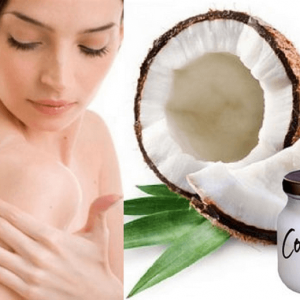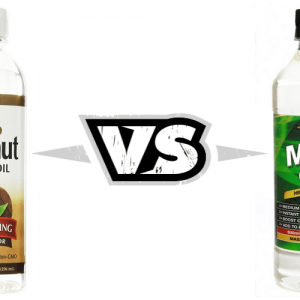
Some people got a breakout after using coconut oil on their face while others found coconut oil good for acne treatment.
So, does coconut oil give you acne?
Before answering that, let’s see why a breakout occurs with coconut oil for some people in the first place.
Which coconut oil causes acne breakout?
RB (refined and bleached), RBD (refined, bleached and deodorized), hydrogenated or virgin coconut oil… which one are they using that causes or helps their acne?
As far as I am concerned, RBD and virgin coconut oil won’t clog your skin pores. So, the chances for them to cause an acne breakout on your back, chest, scalp, face or any other parts of your body are really very slim.
I apply these coconut oils interchangeably on my skin every day and I never experience that so far. Even eating coconut oil daily for health benefits doesn’t trigger any adverse reaction on my skin.
Unless deep down beneath your skin you have amassed so much toxins (via a poor diet) over the years that when you apply particularly RBD or virgin coconut oil, a breakout takes place.
Why is that so?
Medium-chain fatty acids in coconut oil can empower your cells to expel toxins. These toxins then flow to the surface of your skin alongside sebum (your skin oil).
At this juncture, if dead cells clog some of your skin pores, then whiteheads will pop up as the mixture (of toxins and sebum) pushes its way up. The breakout gets worse when you’re already plagued by acne, which will make your pimples even larger.
So, that has something to do with the toxins buried in your skin. Coconut oil does not give you acne in this case, but is helping your skin to detox instead.
Another factor you have to consider is the way you apply coconut oil to your skin.
How to use coconut oil on skin correctly
If you rub it vigorously with force on your skin, you’re actually exfoliating your skin with coconut oil. And the dirt together with the dead cells will form a soft plug that block your pores.
Again in this case, it’s not coconut oil that gives you acne. It’s the incorrect way of applying coconut oil that triggers acne. You should massage the oil gently in circular motion instead.
Actually, it’s better to cleanse your skin thoroughly to make sure your skin especially your face is free of dirt. Next, put on your face a warm damp cloth to help open up the pores. Then, let the pores absorb some water first before applying coconut oil.
A layer of coconut oil on surface can help retain water and keep your skin moisturized for a longer period.
Having said all that, when you use the right type of coconut oil and use it in the right way, it should not give you acne, but help heal your acne instead.
Of course, you must also make sure you have a healthy diet every day. Healthy meals prevent toxins from getting stored in your skin.
Use less cosmetics too since they have toxic chemicals that can seep deep into your skin.








Leave a Reply